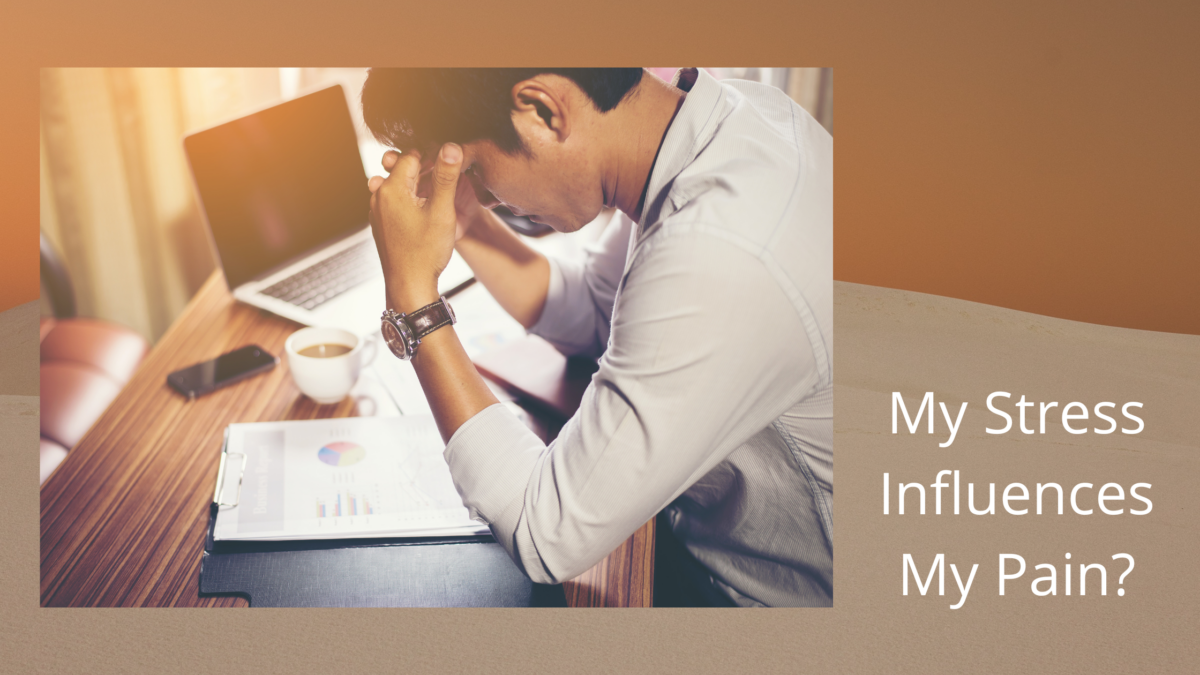Rayanne Garcia, SPT – Texas State University, Doctorate of Physical Therapy Class of 2023
Has anyone ever told you that your stress impacts your pain? Or how about that fact that your stress can impact whether or not you experience pain at all? It all sounds a bit taboo, but current research shows that the prevalence of pain, site of pain, severity of pain, and sensitivity to pain are all significantly correlated to the amount of stress one feels.1,2 In this article, we will delve into the relationships between pain and stress and hypothesize why they occur.
Whether or not you experience pain, and the number of places you feel pain in your body, is affected by your psychological stress.1,2 The topic becomes more interesting when we look at how stress affects the severity of your pain. In an article by Hwang et al.,1 participants were given a survey, called the GARS (Global Assessment of Recent Stress), to evaluate their stress levels from daily life, internal struggles, family, other relationships, work, etc. The authors found that participants with higher GARS scores also reported higher pain severity;1 therefore, the higher the stress, the more pain the participants were experiencing. Within the GARS, pain severity was found to be significantly correlated with economic status, stress from injuries/illnesses, and sensitivity to touch—it makes sense to think that those with more financial stress, other injuries or illnesses, and higher sensitivity would be more likely to experience greater pain.1 In an article by Cathcart,2 the authors compared stress levels for those with chronic headaches and those without headaches. They found that stress levels and muscle tenderness around the head and neck predicted headache severity more than the length of time the participants had headaches.2 This means that this study also found that pain severity is greatly impacted by stress.
One of the most common responses to stress is a headache, especially an occipital headache (at the base of the head).1,2 In those with chronic headaches, high levels of reported stress, increased muscle tenderness in the head and neck, and reduced pain pressure thresholds (PPT) were reported.2 While this study was specifically looking at headaches and stress, many of the findings can be generalized to other areas of pain.
Cathcart2 found that stress and muscle tenderness were strongly correlated. It is reasonable to assume that the participants in this study experienced muscle tenderness in areas other than their head and neck, but which were not documented for the headache study. Depending on where your typical area of pain is, your stress can lead to greater muscle tenderness in that area. This increased muscle tenderness is related to a lower pain pressure threshold, or greater sensitivity to pain;2 stress is also related to PPT.1,2 To bring it all together, higher levels of stress are correlated with greater muscle tenderness and pain sensitivity. Now, let’s try to explain why.
But How Does My Stress Influence My Pain?
Cathcart2 hypothesized that lower pain pressure thresholds, or greater sensitivity to pain, are due to long-term painful input from the muscles and other structures around the painful area. Furthermore, stress enhances pain severity by aggravating muscles that are already tender due to chronic stress.2 Ultimately, painful inputs from muscle and fascial structures are sent to the brain, and these chronic painful inputs are the main cause of higher pain sensitivity.2 After that, our stress further contributes to the pain sensitivity in that it heightens the reaction of already sensitized pain pathways in people that suffer from chronic pain.2
This information can feel overwhelming and may make you feel hopeless. “How am I supposed to stress less?” In this case, however, knowledge is power. Knowing that your stress impacts how much pain you experience gives you the power to acknowledge that your pain does not always mean you are injuring yourself or worsening your existing injury. Under stress, your body is simply more sensitive, and may signal pain at a lower threshold than is typical for you. Once you understand this, you can find ways to decrease your perceived stress, you can exercise knowing you are not injuring yourself, and you can rest easier knowing that you are more in control of your pain experience than you previously thought.
How Can I Manage My Stress More Effectively?
Now that you know how stress affects pain, here are some tips for how to manage stress. If you like phone apps, a few popular and free mindfulness apps include Headspace, Insight Timer, Happify, and ReachOut Breathe. The two links below outline which apps might work well for different types of stress, and the first link includes only free apps.
9 Useful Apps to Help with Anxiety
Lastly, Mindful.org is a website that specializes in stress and stress management, with a magazine and plenty of opportunities to learn new stress management strategies.
Take a look at these websites, take a breath, and take a step toward managing pain with stress management—it just might be the simplest solution to your pain yet!
References:
- Hwang G, Kim S, Kim J, Kim H, Park S, Kim S. Influence of psychological stress on physical pain. Stress Health. 2008;24:159-164. doi: 10.1002/smi.1170
- Cathcart S, Pritchard D. Daily stress and pain sensitivity in chronic tension-type headache sufferers. Stress Health. 2008;24:123-127. doi: 10.1002/smi.1167

